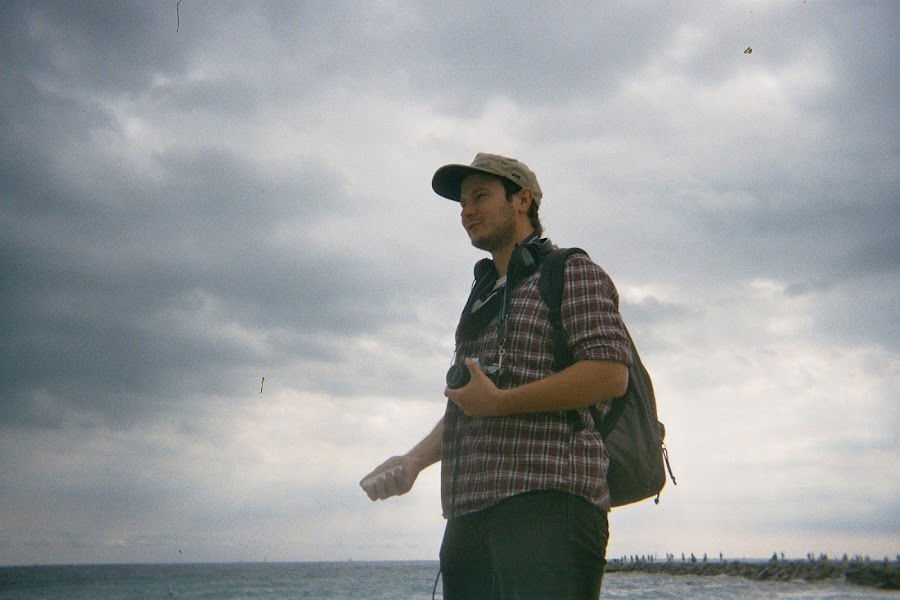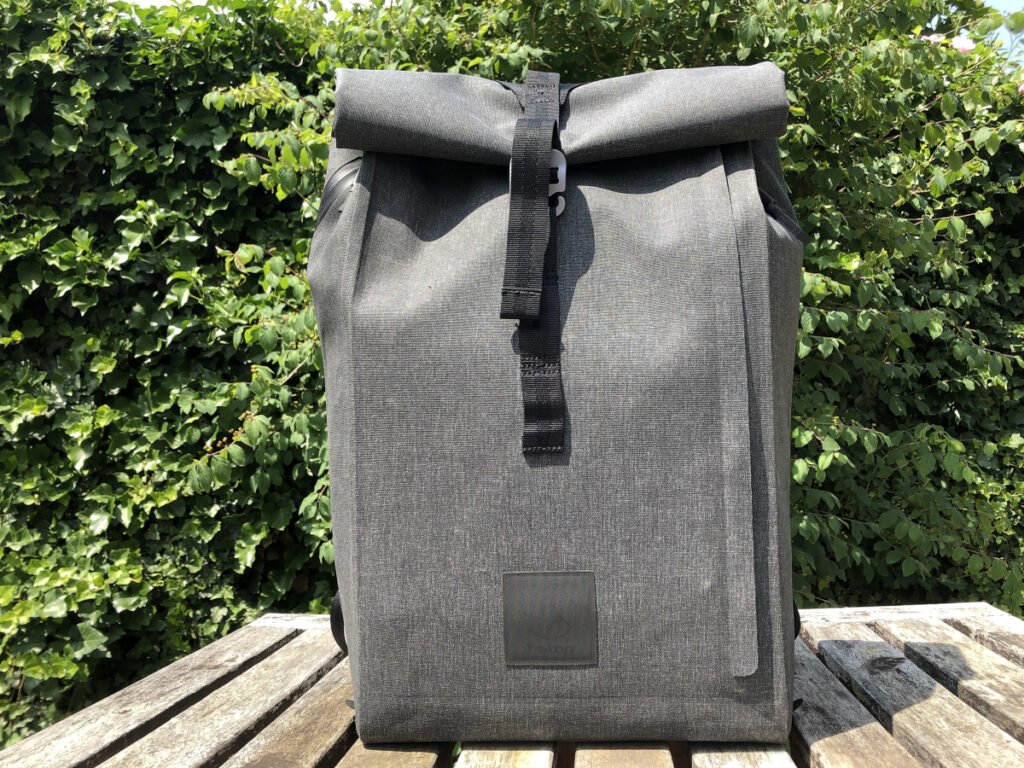If you’ve outgrown your beginner camera, upgrading to the best mid range camera will reignite your passion for photography. Beginner models are great when you’re learning the ropes. But they won’t keep you satisfied forever. A mid range camera presents new opportunities to be creative so you can take your craft to the next level.
The Fujifilm X-T5 is the best mid range camera right now. It has the most powerful APS-C sensor that gives you 40 MP images. There’s a 20 fps burst mode. And you can record 6.2K video footage at 30 fps. And that’s just the tip of the iceberg regarding features.
What Is the Best Mid Range Camera?
The best mid range camera takes your skills to the next level. You’ll have to fork out a bit more when it comes to buying a mid range camera. But the mid range cameras on this list give you a better return on your investment than beginner cameras.
We’ve included APS-C and full frame cameras in our list. APS-C sensors are often associated with entry-level cameras. But as you’ll see, some APS-C cameras have incredible specs and features. They take you to the next level without the need for a larger sensor.
We’ve come to expect decent video features from our cameras. And some of the cameras on this list can create professional-quality videos. They are beyond casual videos for social media. Despite being mid range cameras, you can take pro-level movie footage.
Here’s a rundown of the best mid range cameras with some of the key highlights. We’ll look at every camera in more detail in the section below. And we’ve answered some FAQs on the topic. You can skip to the end if you need more information on the best mid range camera for you.
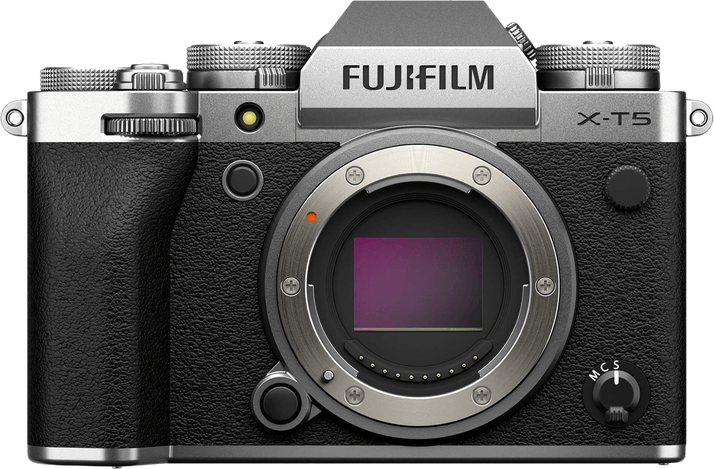
- Powerful 40 MP X-Trans 5 HR sensor
- Seven-stop in-body image stabilization
- Delivers action-freezing shutter speeds up to 1/180,000 s
- Records movies up to 6.2K in 4:2:2 10-bit color
- Pixel Shift Multi-Shot mode for 160 MP images
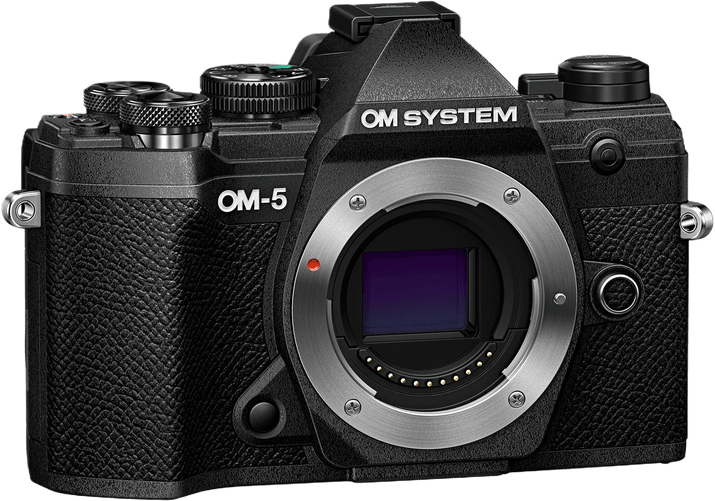
- Handheld High-Res Shot mode gives you 50 MP images
- 4K Photo mode gives you a 30 fps burst mode
- Expandable ISO range with a low option of 64
- Built-in 5-axis image stabilization
- Unlimited 4K video recording at 30 fps
- Completely weather sealed for outdoor shooting
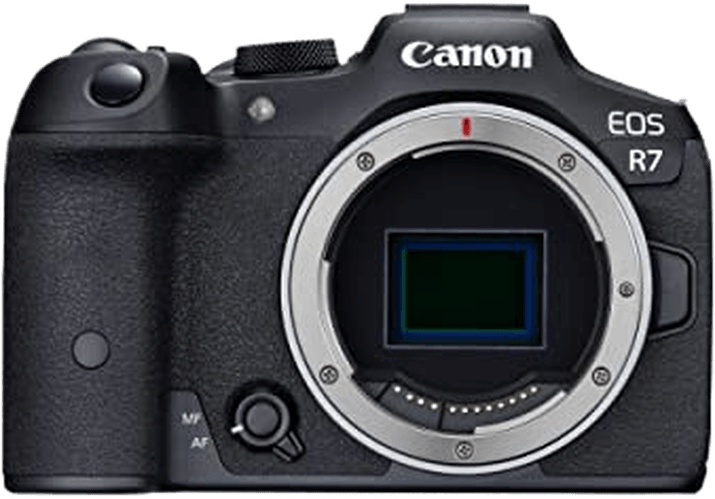
- Exceptional 32.5 MP sensor for high-quality images
- Advanced DIGIC X processor boosts ISO range to 32000
- Dual Pixel CMOS AF II covers 100% of the frame
- Rapid-fire 15 fps mechanical and 30 fps electronic shutter
- Superior subject tracking for people, animals, and vehicles
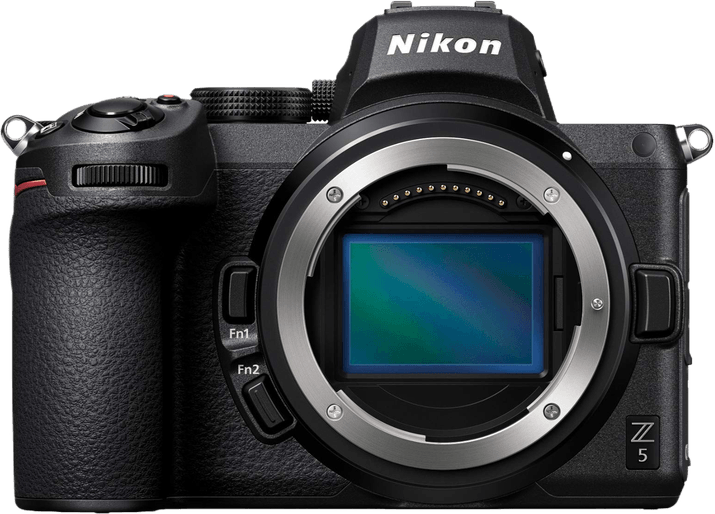
- Full frame sensor for intense, detailed images
- Brilliant low light and 4K UHD video capabilities
- Built-in VR image stabilization for sharp results
- Creative features like time-lapse and multiple exposure modes
- Seamless connectivity for easy image transfer and remote control
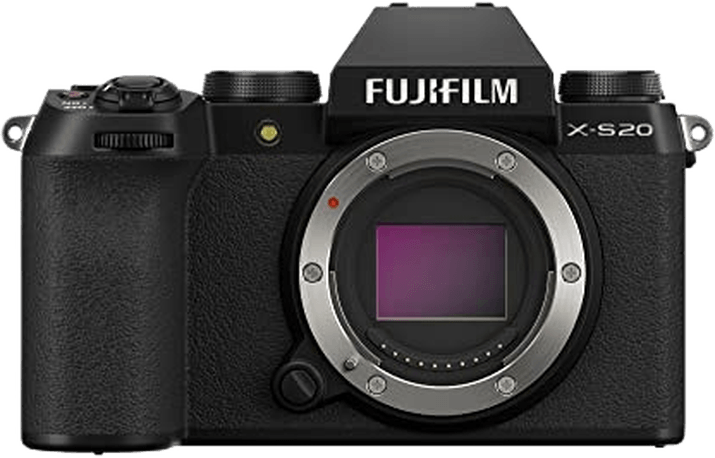
- 26 MP APS-C sensor
- Expanded ISO setting of 80
- Built-in 5-axis image stabilization
- 6.2K video at 30 fps with 10-bit 4:2:2 color
- Uncropped 4K videos with a 120-fps frame rate
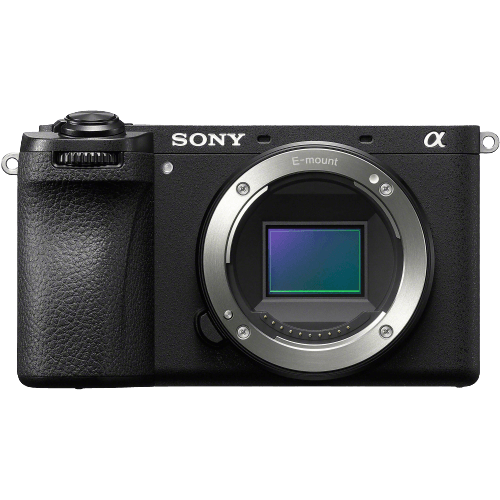
- Improved CMOS sensor
- Wide expandable ISO range (50 to 102,400)
- Built-in image stabilization
- Weather-sealed body
- 4K video recording with 10-bit 4:2:2 color
- 120 fps slow-mo frame rate
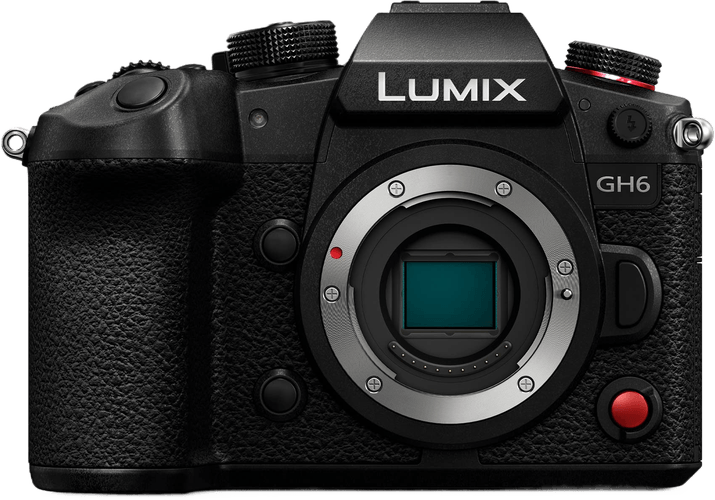
- Boasts a 25.2 MP Live MOS Sensor for high resolution
- Offers 12+ stops of wide dynamic range for realistic images
- Features 4:2:2 10-bit C4K 60p for unlimited video recording
- Includes Dual Image Stabilizer 2 for 7.5 stops of correction
- Provides internal recording in Apple ProRes 422 HQ for high image quality
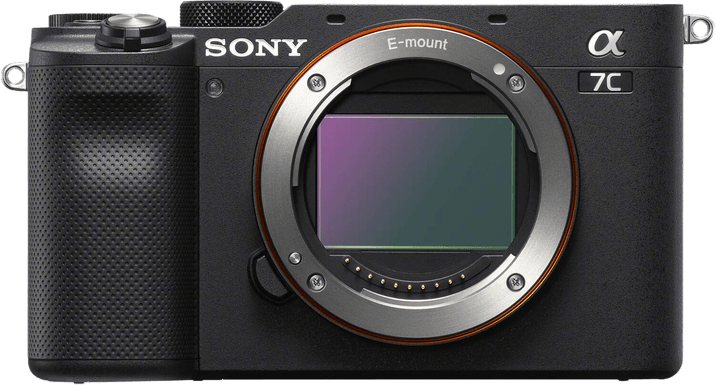
- Tiny, portable full frame body
- Excellent autofocus system
- Good battery life
- Weatherproof magnesium alloy body
- Option of bundling a lightweight 28-60 mm zoom lens kit
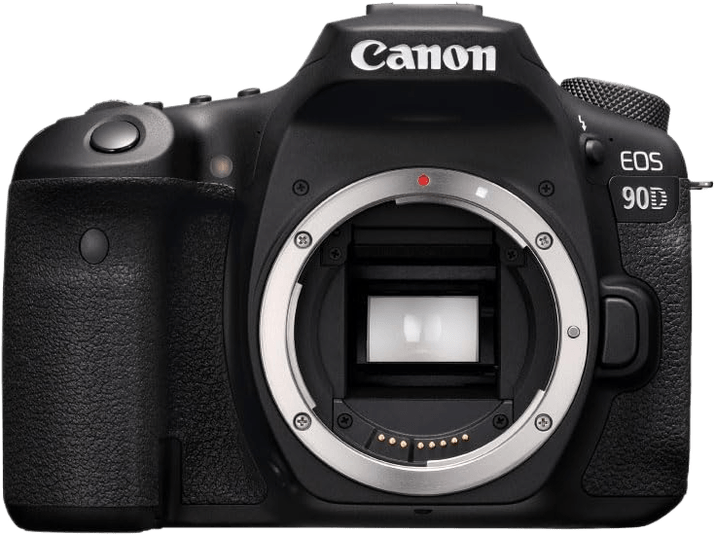
- Excellent 32.5 MP APS-C sensor
- Dual Pixel AF with eye detection
- Decent frame rate of 10 fps
- Good, 1,300-shot battery life
- Live View and 4K/30p Ultra HD video
9 Best Mid Range Cameras
Now we’ll take a closer look at all the best mid range cameras. We’ve included APS-C and full frame mirrorless cameras. There are a couple of MFT cameras. And we’ve even included a mid range DSLR camera for the traditionalists. Whether you’re into photography, video, or a bit of both, there’s a mid range camera for you on this list.
1. Fujifilm X-T5

| Released |
Released
2022
|
| Sensor Format |
Sensor Format
|
| Lens Mount |
Lens Mount
Fujifilm X
|
| Megapixels |
Megapixels
40 MP |
| Autofocus Points |
Autofocus Points
425 |
| Maximum ISO (Native) |
Maximum ISO (Native)
12,800 |
| Frame Rate |
Frame Rate
15 fps |
| In-body Stabilization |
In-body Stabilization
|
| Max Video Resolution |
Max Video Resolution
|
| Other Key Features |
Other Key Features
4K video at 60 fps, weather-sealed body, face detection focusing, High-Resolution Shot mode
|
| Best For |
Best For
Photographers who want a high-tech, stylish camera for creative photography and videography
|
Fujifilm has built a reputation for producing boundary-pushing APS-C mirrorless cameras. And the Fujifilm X-T5 has to be their best example of this to date. It has specs and features never before seen on an APS-C camera. And it has Fujifilm’s trademark retro design that looks fantastic.
We have to start with the image resolution. The camera has an APS-C HR CMOS sensor with a resolution of 40.2 MP. That’s incredible, even for a full frame camera. But on a crop sensor machine, it’s truly groundbreaking.
Other cameras have had issues when stuffing too many pixels on a sensor. It can lead to high levels of digital noise and reduced dynamic range. But image quality from the X-T5 is razor-sharp and crystal-clear.
One complaint about previous X-T models was that the bottom ISO level was 200. Thankfully, Fujifilm has corrected this to a degree. The ISO on the X-T5 is now expandable to 125 ISO. We’d like to see a 100 ISO option in the future. But 125 ISO still gives you beautiful image quality.
And if beautiful image quality is something you’re after, the Fujifilm X-T5 has another trick up its sleeve. With the Pixel Shift Multi-Shot mode, the camera produces 160 MP images. It does this by taking 20 exposures and compositing them together to make one breathtaking image. But you will need a tripod when shooting in this mode.
It’s a great camera for any kind of action photography. The mechanical shutter has a max shutter speed of 1/8000 s, which is pretty quick. But you can also use the electronic shutter for 1/180,000th of a second. With a shutter speed like that, you can capture the fastest of subjects without a trace of motion blur.
You also get fast burst rates to help you capture the action. There’s a 15 fps option with the mechanical shutter. But you can increase that to 20 fps by switching to the electronic shutter. That’s far quicker than most beginner cameras.
We can’t go any further without talking about the video features. Most beginner cameras now have good video production capabilities. But the Fujifilm X-T5 will take your filmmaking to a new level.
You get 6.2K video resolution with a 30 fps frame rate. And that video is recorded in 4:2:2 10-bit color. There’s also a 4K HQ mode. This uses oversampled 6.2K footage to give you even better 4K video results.
The Fujifilm X-T5 has fast and accurate autofocus. It has face and eye detection technology. And it can track fast-moving subjects. And to sweeten the deal even more, it has built-in 5-axis image stabilization. When we say the X-T5 is packed with features, we mean it. That’s why it’s the best mid range camera right now.
2. Olympus OM System OM-5

| Released |
Released
2022
|
| Sensor Format |
Sensor Format
Micro Four Thirds
|
| Lens Mount |
Lens Mount
Micro 4/3
|
| Megapixels |
Megapixels
20 MP
|
| Autofocus Points |
Autofocus Points
121
|
| Maximum ISO (Native) |
Maximum ISO (Native)
25600
|
| Frame Rate |
Frame Rate
30 fps
|
| In-body Stabilization |
In-body Stabilization
1
|
| Max Video Resolution |
Max Video Resolution
4K
|
| Other Key Features |
Other Key Features
HDR mode, webcam functionality, High-Resolution Shot mode, vertical video mode
|
| Best For |
Best For
Anyone who needs a compact camera body with state-of-the-art hybrid features
|
Olympus (now OM System) has become the master of the Micro Four Thirds (MFT) camera. And the Olympus OM System OM-5 is one of their latest flagship machines. It’s compact and lightweight. But it’s brimming with advanced features for photography and video production.
Micro Four Thirds sensors are smaller than APS-C and full frame sensors. The upside is that MFT cameras are more compact and lightweight. But the smaller size does limit the megapixel count.
Despite the size, the sensor still gives you an image resolution of 20 MP. The images look fantastic, with sharp details and true-to-life colors. The dynamic range is also surprisingly good for an MFT camera.
If the standard 20 MP resolution isn’t enough, you also get a more powerful option with the High-Resolution Shot mode. By compositing several exposures together, it gives you sensational 50 MP images. And thanks to the image stabilization system, you can shoot in this mode from hand. You don’t need a tripod.
You also get a built-in HDR (high dynamic range) photography mode. The OM-5 can bracket three to seven different exposures together in-camera. You don’t need any photo editing software. And the results are impressive high dynamic range images.
The OM-5 has an advanced autofocus system that can deal with all types of subjects. It uses 121 focus points on the phase detection AF sensor. It’s quick to find focus. And it can track fast-moving subjects as they move within the frame.
If you’re looking for a camera with good video features, the OM-5 has a lot to offer. You can record sharp 4K footage at 30 fps. You can shoot vertical video, which is handy for vlogging and social media. And you can use it as a webcam, making it an excellent camera for live streaming.
The Olympus OM System OM-5 is a rugged camera with thorough weather sealing. You can use the camera outdoors, even in bad conditions. And despite the OM System rebrand, new models are still compatible with all the best Olympus lenses.
3. Canon EOS R7

| Released |
Released
2022
|
| Sensor Format |
Sensor Format
|
| Lens Mount |
Lens Mount
Canon RF
|
| Megapixels |
Megapixels
33 MP |
| Autofocus Points |
Autofocus Points
651 |
| Maximum ISO (Native) |
Maximum ISO (Native)
32,000 |
| Frame Rate |
Frame Rate
15 fps |
| In-body Stabilization |
In-body Stabilization
|
| Max Video Resolution |
Max Video Resolution
|
| Other Key Features |
Other Key Features
100% AF coverage, dual card slots, 60 fps at 4K, 30 fps electronic shutter
|
| Best For |
Best For
Photographers wanting a fantastic all-around Canon mirrorless camera
|
The Canon EOS R7 is a fantastic mirrorless camera. It has an APS-C sensor, which is usually associated with entry-level machines. But the R7 has impressive features in every department. No matter what type of media you want to create, the R7 gives you far more options than any beginner camera model.
We can start with the powerful image sensor. Even though it’s an APS-C sensor, it has a 32.5 MP resolution. The image quality is spectacular. It doesn’t quite have the dynamic range of Canon’s full frame mirrorless cameras. But you’ll still be turning heads with images from the R7.
In-body image stabilization isn’t something you get with beginner cameras. But the R7’s 5-axis stabilization system helps give you sharper images. It reduces signs of camera shake and motion blur. And this allows you to use slower shutter speeds, improving low-light performance.
Canon’s Dual Pixel CMOS AF technology is famous in the photography world. And the company has used it with great success in this camera. It gives you nearly 100% frame coverage with 651 focus zones and can track moving subjects. And it has face and eye detection abilities for human and animal subjects.
Canon markets the EOS R7 as a mid range vlogging camera. And they have every right to. The camera records in beautiful 4K. But the secret weapon is the 60 fps frame rate you get at full resolution. That gives you bright, clear, and supersmooth footage.
You also get fast photography frame rates. The R7 gives you a very respectable 15 fps burst with the mechanical shutter. But you can also switch to the electronic shutter for a faster 30 fps frame rate. This gives you an incredible advantage if you’re shooting sports photography.
The Canon EOS R7 has a dual card slot. This is a feature that becomes more essential as you grow and develop your skills. It also has a handy control dial on the rear. And there’s a flip-out rotating touchscreen for more convenient shooting. The R7 is a well-thought-out mirrorless camera for anyone taking the next step in their photography journey.
4. Nikon Z5

| Released |
Released
2020
|
| Sensor Format |
Sensor Format
|
| Lens Mount |
Lens Mount
Nikon Z
|
| Megapixels |
Megapixels
24 MP |
| Autofocus Points |
Autofocus Points
273 |
| Maximum ISO (Native) |
Maximum ISO (Native)
51,200 |
| Frame Rate |
Frame Rate
4.5 fps |
| In-body Stabilization |
In-body Stabilization
|
| Max Video Resolution |
Max Video Resolution
|
| Other Key Features |
Other Key Features
Time-lapse video mode, webcam functionality, double exposure mode
|
| Best For |
Best For
Photographers who want to take the next step with a reasonably priced full frame camera
|
The Nikon Z5 is one of Nikon’s finest mirrorless cameras. It has a powerful full frame sensor. You get image stabilization and advanced AF. And you can record beautiful video media. The Z5 sits perfectly between beginner and professional cameras.
The full frame CMOS sensor gives you a 24.3 MP resolution. That might not sound like much for a full frame machine. But the image quality is undeniably excellent. Details are sharp, and the colors are well rendered. And having fewer megapixels on a larger sensor means the pixels are bigger. This increases dynamic range and decreases digital noise.
It has a superfast 1/8000 s max shutter speed, keeping your action shots razor-sharp. There’s a wide ISO range for low-light photography. And the Z5 has built-in 5-axis image stabilization. That gives you even more exposure control for better results in tough conditions.
The Z5 is another great video camera and can record crisp 4K video. The body has ports for external devices like microphones and monitors. And you can use it as a webcam for conference calls and live streaming on Youtube, Instagram, or Twitch. There’s a built-in time-lapse feature too.
Other creative features include a multi-exposure mode. You can create double exposures in-camera without editing software. You can shoot remotely using your smartphone, which is great for self-portrait photographers. And the Z5 has Wi-Fi connectivity for quick transfers to other devices.
The Nikon Z5 is one of the best-value full frame cameras on the market. That doesn’t mean it’s the cheapest. But you get serious bang for your buck. It delivers on all fronts. And it’s lightweight, compact, and has Nikon’s trademark ergonomics.
5. Fujifilm X-S20

| Released |
Released
2023
|
| Sensor Format |
Sensor Format
|
| Lens Mount |
Lens Mount
Fujifilm X
|
| Megapixels |
Megapixels
26 MP |
| Autofocus Points |
Autofocus Points
425 |
| Maximum ISO (Native) |
Maximum ISO (Native)
12,800 |
| Frame Rate |
Frame Rate
20 fps |
| In-body Stabilization |
In-body Stabilization
|
| Max Video Resolution |
Max Video Resolution
|
| Other Key Features |
Other Key Features
4K slow-mo video, ports for external devices, face detection focusing
|
| Best For |
Best For
Anyone who wants advanced video and photo features in a stylish body
|
The Fujifilm X-S20 is the perfect blend of modern technology and retro styling. The X-S20 has the look of a retro 35mm film camera, which is very much in vogue right now. But when it comes to performance and features, the camera is bang up to date.
The APS-C sensor gives you lovely 26 MP images. The details are clear, and the colors are deep and rich. It doesn’t have the raw power of the X-T5. But it’s a big step up from beginner cameras.
The native ISO range is 160 to 12,800. That’s not great, but you can expand the high ISO to 51,200. And when expended, you also get a low setting of 80 ISO. That gives you incredible image quality and detail.
The autofocus system is one of Fujifilm’s best. It uses 425 focus points, giving you nearly full frame coverage. And it has face and eye detection for humans and animals. It’s great for portrait photography and pet photography.
You also get excellent exposure control with built-in 5-axis image stabilization. And it allows you to shoot with slower shutter speeds without getting blurry images.
Filmmakers and vloggers will love the Fujifilm X-S20. You get a maximum video resolution of 6.2K. And you can shoot at 30 fps in full resolution mode. It also records with 10-bit 4:2:2 color, so the footage looks intense yet true to life.
You can also record slow-motion videos with 4K resolution. The 120 fps frame rate gives you 4x slow-mo. And the video is totally uncropped. If you switch to Full HD, you can shoot 8x slow-motion videos with the 240 fps option.
Paired with a computer or laptop, you can use the X-S20 as a high-resolution webcam. That’s ideal for conference calls, vlogging, and live streaming. The LCD touchscreen twists and rotates, making it easy to you film yourself. And the camera also has ports for external microphones and monitors.
We’re disappointed the Fujifilm X-S20 has no weather sealing and only one card slot. But the photo and video features allow for incredible creativity. It’s a versatile mirrorless camera suitable for ambitious photographers and videographers.
6. Sony a6700

| Released |
Released
2023
|
| Sensor Format |
Sensor Format
|
| Lens Mount |
Lens Mount
Sony E
|
| Megapixels |
Megapixels
26 MP |
| Autofocus Points |
Autofocus Points
759 |
| Maximum ISO (Native) |
Maximum ISO (Native)
32,000 |
| Frame Rate |
Frame Rate
11 fps |
| In-body Stabilization |
In-body Stabilization
|
| Max Video Resolution |
Max Video Resolution
|
| Other Key Features |
Other Key Features
AI exposure metering, 4K slow-motion video, weather sealing, webcam functionality
|
| Best For |
Best For
Photographers looking for a compact mirrorless camera with advanced features
|
The Sony a6700 is Sony’s latest entry in their popular APS-C mirrorless camera line. While most of the company’s energy goes into their full frame cameras, they keep producing excellent APS-C cameras in their a6000 line. And the a6700 is the best one yet.
The a6700 is equipped with an APS-C Exmor R back-illuminated CMOS sensor. And that’s backed by a BIONZ XR processor. That might sound technical. But that hardware delivers gorgeous 26 MP images.
You also get a wide ISO range, from 100 to 32,000. And the dynamic range is fantastic for an APS-C camera. You get clarity and detail even in areas of strong light or shadow. It’s impressive for such a small camera.
The 5-axis image stabilization is a big upgrade in the a6700. It reduces camera shake, giving you more freedom with your exposure settings. You’re guaranteed sharp images even in tough conditions.
The a6700 even uses AI technology to give you better-exposed images. It detects skin tones on faces to accurately expose your subject within the scene. That makes it a great camera for portrait photography.
The a6700 uses AI for faster and more accurate autofocusing. The AI processor reads the scene in front of you and intelligently tracks the subject’s movements. That gives you super quick and reliable focusing, even if you’re shooting sports or action.
The video features are where the Sony a6700 really excels. We’ve become accustomed to cameras having 4K recording. And while there’s nothing wrong with 4K recorded at 30 fps, the a6700 can do better than that.
With the a6700, you can record 4K (10-bit 4:2:2 color) videos with a 120 fps frame rate. That means you can shoot 4x slow-motion videos with a glorious 4K resolution. And if that’s not fast enough, you can shoot at 240 fps in Full HD. That’s another reason this camera is great for sports and action media.
The weather-sealed body means you can use the Sony a6700 outside in bad weather. It has Wi-Fi and Bluetooth connectivity. And you can use the camera as a webcam. The main downside is that it only has one SD card slot. But other than that, the a6700 is a brilliant mid range camera.
7. Panasonic Lumix GH6

| Released |
Released
2022
|
| Sensor Format |
Sensor Format
|
| Lens Mount |
Lens Mount
Micro 4/3
|
| Megapixels |
Megapixels
25 MP |
| Autofocus Points |
Autofocus Points
315 |
| Maximum ISO (Native) |
Maximum ISO (Native)
25,600 |
| Frame Rate |
Frame Rate
14 fps |
| In-body Stabilization |
In-body Stabilization
|
| Max Video Resolution |
Max Video Resolution
|
| Other Key Features |
Other Key Features
Dual SD card slot, 4K at 60 fps, weather-sealed body, ports for external devices, 6K photo mode
|
| Best For |
Best For
Anyone with a passion for videography and filmmaking
|
Panasonic Lumix has built its reputation on producing fantastic hybrid cameras. And for anyone with a passion for video production, the Panasonic Lumix GH6 is one of the best mid range cameras. It’s a compact, robust multimedia machine that delivers pro results.
The GH6 has a compact camera body thanks to the Micro Four Thirds (MFT) sensor. And despite the smaller size, it still gives you 25 MP images. That’s excellent resolution for an MFT camera.
It’s also equipped with a wide ISO range, so it copes well in low light. And the sensor has the best dynamic range of any MFT camera. That goes for still photography and video recording. The 5-axis image stabilization gives you even more control over your exposure settings, giving you better results in tough conditions.
With 4K 10-bit 4:2:2 color recording, you can shoot beautiful videos. But with the GH6, you can do even better than 4K. You can shoot 5.7K video with 4:2:0 color and a 60 fps frame rate. This video type gives you a 17:9 aspect ratio. You can also shoot in fabulous 5.8K with a 30 fps rate in 10-bit 4:2:0 anamorphic mode. This has a 4:3 aspect ratio.
The body is equipped with all the necessary ports for video production. You have jacks for external microphones. And there’s an HDMI output for external monitor and screen viewing. That takes you to the next level of video production.
The Panasonic Lumix GH6 is packed with handy features. There are dual card slots for more storage. The LCD screen tilts and rotates. You can charge the camera with a USB cable. And it’s weather sealed for outdoor shooting. It’s an all-in-one multimedia masterpiece.
8. Sony a7C

| Released |
Released
2020
|
| Sensor Format |
Sensor Format
|
| Lens Mount |
Lens Mount
Sony FE
|
| Megapixels |
Megapixels
24.2 MP |
| Autofocus Points |
Autofocus Points
693 |
| Maximum ISO (Native) |
Maximum ISO (Native)
51,200 |
| Frame Rate |
Frame Rate
10 fps |
| In-body Stabilization |
In-body Stabilization
|
| Max Video Resolution |
Max Video Resolution
|
| Other Key Features |
Other Key Features
AI-powered AF tracking, 50 ISO setting, ports for external devices
|
| Best For |
Best For
Videographers, filmmakers, and vloggers looking for a full frame camera
|
The Sony a7C is a full frame mirrorless camera optimized for video production. Although released a few years ago, it remains one of the smallest full frame cameras available. It’ll fit in any of the best camera backpacks. And it has brilliant features for photography and video production.
The full frame sensor gives you a 24.2 MP resolution. That’s not groundbreaking for a full frame mirrorless, especially by Sony standards. But the image quality is excellent. It’s backed by a powerful BIONZ X processor. And the larger pixels give you a better dynamic range.
In fact, the camera gives you 15 stops of dynamic range. And it has an expandable ISO range of 50 to 204,800. You won’t experience any noise until the highest levels. And the 50 ISO setting gives you maximum image quality in terms of clarity, color, and definition.
You can shoot gorgeous 4K videos with a smooth 30 fps frame rate. And there’s a 120 fps rate in Full HD for slow-motion video capture. The 4K video is uncropped and looks beautifully cinematic.
The flip-out rotating touchscreen is ideal for vloggers. You have external ports for sound recording equipment. And the a7C doubles as a webcam for live streaming. You can also use the camera remotely using a Wi-Fi connection and a smartphone.
The autofocus system is fast and reliable when shooting stills and videos. It uses 693 focus points across the frame. And these detect your subject and track it as it moves. It also has AF modes for face and eye recognition. And there’s a mode for animal photography.
The Sony a7C remains one of the best video and vlogging cameras. It’s a fantastic choice if you’re a video producer looking to upgrade to a full frame camera. And you get your pick of the best Sony FE lenses.
9. Canon EOS 90D

| Released |
Released
2019
|
| Sensor Format |
Sensor Format
|
| Lens Mount |
Lens Mount
Canon EF/EF-S
|
| Megapixels |
Megapixels
33 MP |
| Autofocus Points |
Autofocus Points
45 |
| Maximum ISO (Native) |
Maximum ISO (Native)
25,600 |
| Frame Rate |
Frame Rate
10 fps |
| In-body Stabilization |
In-body Stabilization
|
| Max Video Resolution |
Max Video Resolution
|
| Other Key Features |
Other Key Features
Webcam functionality, eye detection AF, custom control pad
|
| Best For |
Best For
Traditional photography fans that want more power from a compact camera body
|
Once rulers of the photography world, DSLR cameras are now on the way out. But DSLRs still have a lot to offer photographers with a sense of tradition. Flash gimmicks and ultra-high-tech features aren’t for everyone. And the Canon EOS 90D is perfect for photography purists.
The 90D has an APS-C sensor, which is why it has a compact body for a mid range DSLR. It’s also one of the most powerful APS-C sensors on the market. And that’s still true today.
It gives you a wonderful 32.5 MP resolution. That’s much greater than any entry-level DSLR camera. The quality is good enough for print media and enlargement. And that’s good to know if you want to make money from photography.
The 90D is also one of the best DSLR cameras for video. You can record 4K video with a smooth 30 fps frame rate. And there’s a 120 fps option when you switch to Full HD recording. It also works as a Full HD webcam, allowing you to use it for conference calls and live streaming.
The AF system might seem primitive compared to some mirrorless systems. It has 45 cross-type focus points with about 80% frame coverage. And it has face and eye detection autofocus modes, which are ideal for portrait photography. You also get full AF tracking support when using the 10 fps burst mode.
The Canon EOS 90D has Wi-Fi and Bluetooth connectivity for easy media sharing. It has a vari-angle touchscreen that’s great for selfies and vlogs. And you get two customizable controllers on the rear control panel. It also has a built-in flash, which is always handy.
FAQs on the Best Mid Range Cameras
Finding the best mid range camera isn’t easy. That’s why we’ve answered some of the most frequently asked questions on the topic.
What Is a Mid Range Camera?
A mid range camera has more advanced features and better performance than a beginner camera. But it doesn’t have the ultra-high-tech features or performance of a professional camera. There’s no exact definition. But they sit in the middle of beginner and professional cameras.
Mid range cameras are for photographers who have outgrown their beginner gear. There are some great beginner cameras out there, like the Canon EOS R100. But entry-level machines are limited. Mid range cameras are the next step of the journey, allowing you to hone and develop your skills.
You can expect better specs and performance from mid range cameras. While a beginner camera might give you an image resolution of 20 to 24 MP, a mid range model can give you anything between 25 and 40 megapixels.
You will also see advancement in other features like video. Many cameras on this list give you more than 4K video. You also get faster burst rates, better AF systems, and more shooting modes.
There’s also a jump in price when upgrading to a mid range camera. When it comes to beginner cameras, you can find some bargains. But you will have to fork out a bit more when upgrading to a mid range model. They don’t have the eye-watering prices of pro models. But you need to be prepared to spend a bit more.
Which Mid Range Camera Has the Best Resolution?
The Fujifilm X-T5 has the highest resolution of any mid range camera. Even though it only has an APS-C sensor, it delivers 40 MP images. That’s the highest resolution of any APS-C camera. It’s pro-level image production.
And if 40 MP isn’t enough, the X-T5 also has a High-Resolution Shot mode. By combining several exposures, it produces a staggering 160 MP image. That makes it a true high-resolution camera.
The Canon EOS R7 is another high-resolution mid range camera. It’s an APS-C mirrorless camera with a 32.5 MP resolution. It gives you fabulous images with rich colors and sharp details.
We can’t forget the Canon EOS 90D. When it was released in 2019, it had the most powerful APS-C sensor. It has since been surpassed, but it still gives you a 32.5 MP resolution. That means this DSLR is a great option for traditional photographers who want high-res images.
Which Mid Range Camera Is Best for Video?
Again, the Fujifilm X-T5 tops the list. It gives you outstanding 6.2K video with 10-bit 4:2:2 color and a 30 fps frame rate. You can also shoot 4K slow-motion footage. That’s more than enough for social media videos. And you can create cinematic feature films.
The Olympus OM System OM-5 has excellent video features for a Micro Four Thirds (MFT) camera. You get a lovely 4K resolution. And it has a vertical video mode to fit social media platforms. And you can use it as a webcam for streaming.
The OM-5 is great, but the Panasonic Lumix GH6 is the best MFT camera for video. You get a wide range of shooting options, including 5.8K resolution with a 30 fps frame rate. And there are 4K and Full HD options with faster frame rates. It also has microphone jacks and an HDMI output. It’s an incredible hybrid camera for videography.
Which Mid Range Camera Has the Fastest Burst Speed?
The Fujifilm X-T5 and X-S20 both have rapid burst speeds, with both cameras giving you 20 frames per second.
But the winner has to be the Olympus OM System OM-5. This tiny MFT camera has an impressive 30 fps burst rate. That’s lightning-quick and helps you capture all those blink-and-you-miss-it moments. It’s ideal for sports and action photography. But a burst like that also helps you with wildlife photography.
Conclusion: The Best Mid Range Cameras
The best mid range camera gives you new creative choices and challenges. They outperform your old beginner model. And they are packed with exciting new features that’ll take your media production to the next level.
The Fujifilm X-T5 is the best mid range camera. It has a powerful APS-C sensor with a 40 MP resolution. You can record 6.2K videos at 30 fps. And it has advanced AF, Pixel Shift Shot mode, and a 20 fps burst. It’s also weather sealed for outdoor shooting. It’s the total package in the mid range division.
